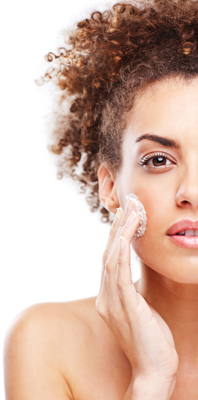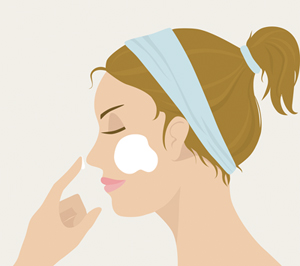Dermatological drama
Pregnancy is a beautiful experience, but as your body changes […]

Acne
Weren’t pimples supposed to go away when you turned 16? “My skin was so unpredictable,” recalls Callie Flores, mom of one in Loganville, Georgia. “One day I would have beautiful, glowing skin, and the next I would wake up with a horrible acne breakout on my face.” During pregnancy, changes in estrogen levels cause glands to secrete more oil than normal. Combined with excess skin cells, this oil will clog pores, produce bacteria and cause breakouts. Luckily this time around, you don’t have to worry about whether your crush is going to ask you to prom—just look for face washes that contain no more than 2 to 5 percent benzoyl peroxide. Most dermatologists advise avoiding salicylic acid since studies have linked the product to birth defects and other pregnancy complications. And though a chemical peel may temporarily provide results, these too are best avoided until after pregnancy, since hormonal changes may cause the breakout to worsen after treatment.
Increased hormones can cause irksome little polyps to set up camp where skin rubs against clothing or other skin, such as in neck folds or bra lines. These tags will most likely disappear on their own postpartum, but if they’re bothersome or don’t hit the road when your tot arrives, a doctor can easily remove them.
Melasma
“Darkening of the skin, or melasma, is one of the most concerning skin changes of pregnancy to many patients because of its presence on the face. Although there are no associated health problems, it can still have a significant effect on the patient’s quality of life,” explains Nicole Mathis, MD, physician at Westlake Dermatology and Cosmetic Surgery in Austin, Texas. The dark splotchy patches of the dreaded “mask of pregnancy” are caused by increases in melanin, the pigmentation hormone. Melanin can also cause a linea nigra (literally “dark line”) to appear down the center of your stomach. Both of these will fade on their own postpregnancy. The best defenses against melasma include avoiding the sun, wearing sunscreen if you have to be outside, and steering clear of soy-based facial products, which can exacerbate the dark patches. Topical ointments can help fade concentrated bursts of pigmentation to ease your facial woes.
Moles
According to Mathis, more than 10 percent of women will experience darkening of their moles during the first trimester due to elevated stimulation of progesterone and melanocytes. Pregnant or not, always check for “ABCD” when it comes to new or changing moles: asymmetry, border irregularities, color changes and diameter greater than 6 millimeters or increasing diameter in general. If any of these occur, be sure to see a dermatologist immediately.
 Atopic dermatitis
Atopic dermatitisBetween one-third and one-half of women will experience atopic dermatitis during pregnancy, and mamas-to-be with histories of allergies, asthma or eczema are more prone to these chronic and inflammatory bouts of itching. In 60 to 80 percent of cases, atopic dermatitis will lay dormant for years and only present because of body changes after conception. Over-the-counter anti-itch creams and calamine lotion can help—and you may consider buying an air purifier for your home to filter out airborne irritants.
PUPPP
PUPPP stands for pruritic urticarial papules and plaques of pregnancy, and this mouth- ful of a condition causes hives and itchy red bumps to spring up on your skin. “PUPPP typically presents in women who are pregnant for the first time or are expecting multiples as it can be a side effect of rapid weight gain,” says Mathis. “If not severe, it can be treated with topical steroids and emollients. If you have a slightly worse case, a short course of prednisone will do the trick.”
Glowing skin
The old wives were right about this one. You’ve probably been complimented on your face’s attractive blush over and over, but it isn’t just your happy spirit that’s responsible for the radiant sheen. There’s actually a bona fide scientific reason for the change. During pregnancy, your blood flow will increase to provide nutrients to your baby. The resulting surge causes blood vessels just below the skin’s surface to become pronounced (the same reason your face turns red after exercising or when you become embarrassed).
Stretch marks
Unfortunately, 90 percent of women get stretch marks during pregnancy, and genetics play a huge role (thanks, mom). These may fade in color after delivery, but treatment with topical retinoids can help speed up the process. If you’re feeling more aggressive, pulsed dye or fractioned lasers can help remove them after you’ve given birth. If you’re not the medical intervention type, you can join the growing ranks of moms who embrace their marks as battle scars. “I gained quite a bit of weight over the course of my pregnancy so I had stretch marks,” Flores says. “I kept them under control with some wonderful over-the-counter products and now proudly call them my tiger stripes!”
Itchy skin
Rapid stretching of the skin can cause itching that rivals chicken pox. Expanding bellies wake up the cutaneous nerves in your skin, which can have you feeling scaly as a dragon (your partner may agree with this comparison if your hormones have you breathing fire), but moisturizing, wearing loose clothing, avoiding scalding hot showers, and seeing your doctor about an oral anti-itch medication, if necessary, can help.
All these changes can be scary, frustrating and downright infuriating at times. But Flores encourages, “Find out what works for you and stick with it. And most importantly, enjoy your pregnancy, and embrace every good and bad detail because there is no other experience like it!” So as you gaze in the mirror wishing the bumps and marks would go away, remember: Your little one has to get under your skin to get into your heart.







